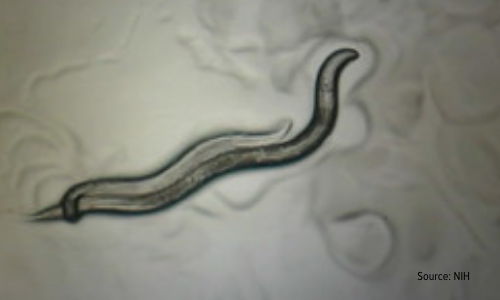Using Worms to Treat Allergies
Addressing and Treating Autoimmune Diseases and Allergies
In August 2021, HJF received patents in the United States, Australia, and Europe for an innovative treatment for allergies or other autoimmune diseases using a homogenate of Caenorhabditis elegans antigens. C. elegans is a transparent nematode (or roundworm) about 1 millimeter in length that lives in soil. While using a worm to treat autoimmune disease has been done before, this new technology focuses on using a non-pathogenic, non-parasitic worm, specifically using a composition created from a single strain, C. elegans, grown in a controlled environment devoid of other living organisms.
Current Landscape
Other worm-mediated therapies have used parasitic worms to affect the immune response through a signaling process that increases the level of a type of IgE antibody and recruitment of types of white blood cells (basophils and eosinophils).
This combination of reactions results in suppression of excessive inflammatory responses, thus alleviating allergy and autoimmune disease symptoms. Using parasitic worms has had positive results in treating inflammatory bowel disease (IBD), asthma and various allergies. However, there are several factors limiting widespread clinical use of such therapies.
The parasites must be derived from animal hosts, and there are associated difficulties ensuring purity and homogeneity of parasitic worms from batch to batch, with a risk of pathology induced from live worm infections. Additionally, patients are often reluctant to be infected with parasitic worms.

Innovation and Partnership
This HJF-patented process moves away from administration of live parasitic worms, instead growing a single strain of non-parasitic worms in a controlled environment and then creating a homogenate of the material for therapeutic use.
This innovation was developed by Dr. Edward Mitre of The Uniformed Services University of Health Sciences (USU) Department of Microbiology, along with HJF co-inventors Drs. Belinda Jackson and Marina Torrero.
They found that treatment with this homogenate resulted in similar antibody and white-blood cell response as that elicited by the parasitic-worm treatment. This strategy further benefits from an easier, controlled and sterile production method, enabling large scale production, with batch-to-batch consistency, and a method that lends itself to scalability and quality control.
The researchers intend to further this innovation to advance new treatment strategies for autoimmune diseases, including insulin-dependent diabetes mellitus, scleroderma, multiple sclerosis, posterior uveitis, Crohn’s disease, inflammatory bowel disease, and rheumatoid arthritis.
HJF and USU recently signed a Cooperative Research and Development Agreement (CRADA) with Elegance Biotechnologies, a start-up company focused on advancing C. elegans strategies both as a regulated therapy and as a nutritional supplement for autoimmunity and inflammatory disorders.
The CRADA enables USU, HJF and Elegance to collaborate and develop the approach protected by this new patent, and both Drs. Mitre and Jackson will provide advice and input to Elegance through their role on the company’s scientific advisory board.